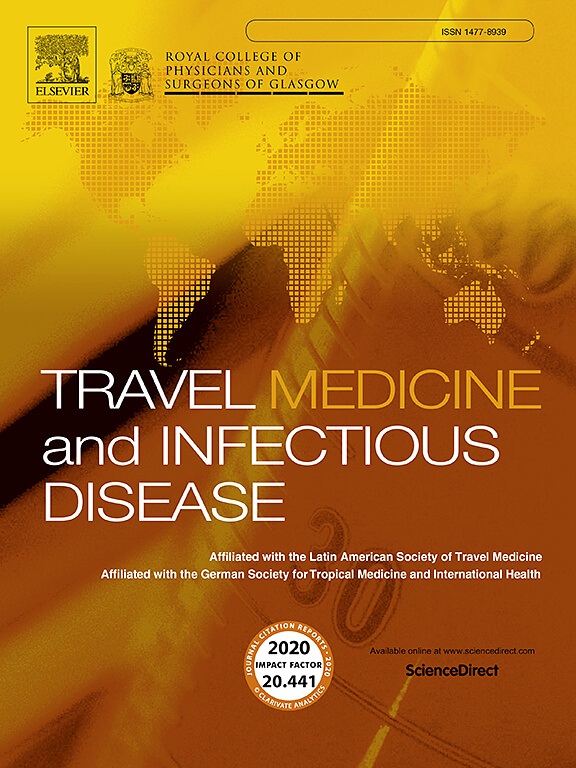土耳其的疟疾:在消除疟疾十年后对COVID-19的诊断、治疗和影响的综合分析(2012-2023)
IF 4.7
3区 医学
Q1 INFECTIOUS DISEASES
引用次数: 0
摘要
背景:除了少数病例报告外,过去十年土耳其疟疾的特点、诊断和治疗阶段尚不清楚。我们的目的是描述在宣布消除疟疾后,2012年至2023年期间土耳其各医院疟疾病例的诊断和治疗实践的细节。方法采用质量调查软件对30个中心的患者资料进行收集。根据世卫组织疟疾严重疾病症状指南对患者进行分类。结果共检出疟疾病例299例。在这些患者中,23.7%出现误诊,77.5%的误诊病例接受了抗生素治疗。其中9例(3%)无旅行史。此外,28例(9.4%)患者在住院期间需要入住重症监护病房(ICU)。误诊与随后的ICU住院之间存在显著关联。此外,疟疾诊断和开始治疗之间的持续时间显著影响ICU入院。此外,在COVID-19期间后,重症疟疾病例(根据世卫组织标准)和ICU入院人数有所增加。在多因素分析中,发现初始误诊与ICU住院相关(OR: 2.8, p <;0.05),而诊断后每延迟一天的治疗会增加ICU入院率(OR: 1.26, p <;0.05)。结论误诊率高,延误治疗,与icu住院率高有关。covid -19后,ICU入院人数和严重疟疾病例均显着增加,表明疾病严重程度升级,值得进一步调查。没有出国旅行史的罕见疟疾病例再次出现,突出表明必须继续警惕新的疟疾病例。在疟疾不常见的土耳其,在诊断时及时治疗和提高诊断准确性的努力至关重要。加强诊断方法和治疗策略仍然至关重要,特别是在COVID-19等重大事件中。本文章由计算机程序翻译,如有差异,请以英文原文为准。
Malaria in Turkey: A comprehensive analysis of diagnosis, treatment, and the impact of COVID-19, ten years after malaria elimination (2012–2023)
Background
The characteristics, diagnosis, and treatment stages of malaria in Turkey in the last ten years are not known except few case reports. We aimed to describe the details of the diagnosis and treatment practices of malaria cases in various hospitals across Turkey between 2012 and 2023 after the declaration of the elimination of malaria.
Methods
We collected the patient data from 30 centers by using Qualtrics Survey Software. The patients were categorized according to the WHO Malaria Severe Disease Symptoms guidelines.
Results
We detected 299 malaria cases. Of these patients, 23.7 % experienced misdiagnosis, with 77.5 % of misdiagnosed cases receiving antibiotics. Among the patients, 9 (3 %) had no travel history. Additionally, 28 (9.4 %) patients required admission to the intensive care unit (ICU) during hospitalization. There is a significant association between misdiagnosis and subsequent ICU admissions. Additionally, the duration between malaria diagnosis and the initiation of treatment significantly affected ICU admissions. Furthermore, the number of cases with severe malaria (according to WHO criteria) and ICU admissions increased after the COVID-19 period. In multivariate analysis, initial misdiagnosis was found to be associated with ICU admission (OR: 2.8, p < 0.05), while each day's treatment delays post-diagnosis increased ICU admissions (OR: 1.26, p < 0.05).
Conclusion
Misdiagnosis is common which delays the treatment and is correlated with higher admissions to ICUs. Post-COVID-19, there was a notable increase in both ICU admissions and cases of severe malaria, suggesting an escalation in disease severity that warrants further investigation. The resurgence of rare malaria cases with no travel history to abroad highlights the necessity of continued vigilance for new malaria cases. Efforts to promptly treat upon diagnosis and improve diagnostic accuracy in Turkey, where malaria is uncommon, are crucial. Enhancing diagnostic methods and treatment strategies remains essential, especially in significant events like COVID-19.
求助全文
通过发布文献求助,成功后即可免费获取论文全文。
去求助
来源期刊

Travel Medicine and Infectious Disease
PUBLIC, ENVIRONMENTAL & OCCUPATIONAL HEALTH-INFECTIOUS DISEASES
CiteScore
19.40
自引率
1.70%
发文量
211
审稿时长
49 days
期刊介绍:
Travel Medicine and Infectious Disease
Publication Scope:
Publishes original papers, reviews, and consensus papers
Primary theme: infectious disease in the context of travel medicine
Focus Areas:
Epidemiology and surveillance of travel-related illness
Prevention and treatment of travel-associated infections
Malaria prevention and treatment
Travellers' diarrhoea
Infections associated with mass gatherings
Migration-related infections
Vaccines and vaccine-preventable disease
Global policy/regulations for disease prevention and control
Practical clinical issues for travel and tropical medicine practitioners
Coverage:
Addresses areas of controversy and debate in travel medicine
Aims to inform guidelines and policy pertinent to travel medicine and the prevention of infectious disease
Publication Features:
Offers a fast peer-review process
Provides early online publication of accepted manuscripts
Aims to publish cutting-edge papers
 求助内容:
求助内容: 应助结果提醒方式:
应助结果提醒方式:


